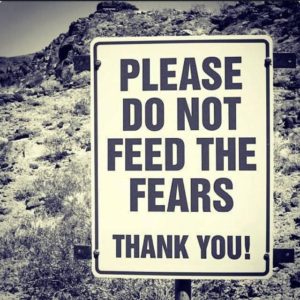Previous articles in this series:
- Panic Attacks Part 1: What is Panic & Why We Need It
- Panic Attacks Part 2: The Antidote for Panic & Relaxation Breathing
Panic attacks feel very intense when you have them. At best, it’s not a comfortable feeling. At worst, it feels very scary because your body feels like it’s out of control. Some people even worry that they are having a heart attack. If you are experiencing these symptoms for the first time, definitely talk with a medical professional to rule out any medical causes before treating the symptoms as a panic attack. This is important for two reasons. The first is that you need to get a proper diagnosis. The second is that if you are constantly worrying that you are having a heart attack…that’s going to increase your anxiety and make successfully treating panic very difficult.
 Once you know that your body is healthy and ok, it’s time to dig in to the emotional aspects that come into play with panic and anxiety. When you worry too much about the possibility that you might have a panic attack, then this worry itself can become the trigger for your next panic attack. I call this having “fear of the fear (that it will happen again).” With the use of acceptance, information, “growth mindset,” and skill development, here are some guidelines that work against the negative spiral that can happen when people start to develop a “fear of the fear.” This article assumes that you already have started working on developing the skills for turning around a panic attack and is part 3 of a four-part series of articles I hope to complete. Hopefully, I’ll get part 4 up soon!
Once you know that your body is healthy and ok, it’s time to dig in to the emotional aspects that come into play with panic and anxiety. When you worry too much about the possibility that you might have a panic attack, then this worry itself can become the trigger for your next panic attack. I call this having “fear of the fear (that it will happen again).” With the use of acceptance, information, “growth mindset,” and skill development, here are some guidelines that work against the negative spiral that can happen when people start to develop a “fear of the fear.” This article assumes that you already have started working on developing the skills for turning around a panic attack and is part 3 of a four-part series of articles I hope to complete. Hopefully, I’ll get part 4 up soon!
- Recognize that this is a new situation for you and, because of that, it makes sense that it’s hard in the beginning to figure out what’s happening and how best to manage it. Also, know that you’re not alone. There are many people who have or are currently going through this too.You are having, what is called, a panic attack. [Growth Mindset]
- Remember that fight or flight mode is a normal thing that our bodies do. The only problem is that it’s getting triggered when you don’t actually need to respond physically to an emotionally stressful situation. The most important thing to know here is, NO HARM WILL COME TO YOUR BODY AS YOU EXPERIENCE IT (your body physically revving up to fight or flee). It does feel yucky to be in physical panic mode. This is especially true because your body, in that moment, is primed with an abundance of energy to physically react and that means that you experience temporary physical changes to your body (i.e. increased heart rate, quick & shallow breathing, increased blood circulation to muscles, decreased blood circulation to the “rational” part of your brain, and more), but your body naturally knows how to shift out of this mode when the perception of a physical threat is gone. [Watch this great video about how the US government has learned to train Navy SEALS not to panic.]
- Accept that this is not your last panic attack. What I’m saying here is find a way to be ok with knowing that it will happen again AND that should one happen and your growing relaxation and cognitive skills can’t turn it around, you can ride it out until it’s done and be still be ok. In general, the goal is for the panic attacks to start reducing in intensity as you get better at turning them around but this won’t happen if you avoid panic attacks, or things that might cause them, rather than face them. [Acceptance]
- Continue to experiment with and practice various relaxation techniques (relaxation breathing is the most important one for panic) and good self care habits so that you can hone your skills and have more “tools” in your “toolbox” when the need arises. [Skill Development]
- Work on developing cognitive strategies that can help prevent panic attacks from happening or intervene at the early signs of panic so that you can prevent a full blown physical response. [Skill Development]
- Keep a list of things that help turn your panic attacks around so that you can refer to the list the next time. [Skill Development]
- Remembering that low blood sugar, hypoglycemia, can mimic the beginning feelings of a panic attack, carry a healthy snack with you that has a nice combination of protein and complex carbs. [Check out this podcast by Dr. Kristen Allot about why this is so incredibly important.]
- Minimize or, ideally, eliminate caffeine. Drink water. Enjoy water. Did I mention water? [Information]
Remaining article in this series:
- Panic Attacks Part 4: Time To Tune Into Your Early Warning System (coming soon)
